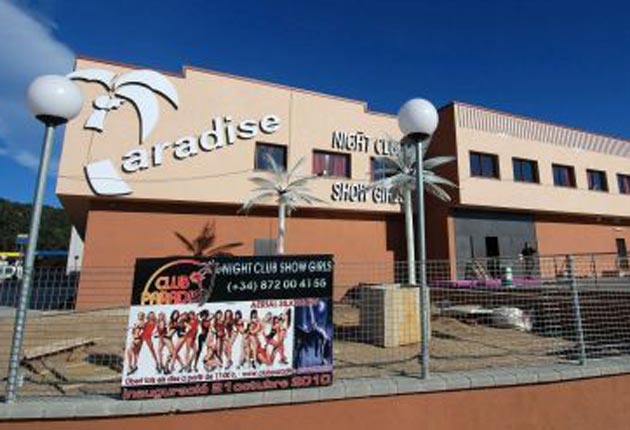Open for business: the brothel with 1,800 prostitutes

Your support helps us to tell the story
From reproductive rights to climate change to Big Tech, The Independent is on the ground when the story is developing. Whether it's investigating the financials of Elon Musk's pro-Trump PAC or producing our latest documentary, 'The A Word', which shines a light on the American women fighting for reproductive rights, we know how important it is to parse out the facts from the messaging.
At such a critical moment in US history, we need reporters on the ground. Your donation allows us to keep sending journalists to speak to both sides of the story.
The Independent is trusted by Americans across the entire political spectrum. And unlike many other quality news outlets, we choose not to lock Americans out of our reporting and analysis with paywalls. We believe quality journalism should be available to everyone, paid for by those who can afford it.
Your support makes all the difference.The Paradise night club, touted as the largest brothel in Europe, has opened for business after a Spanish town failed to stop it in the courts.
Police patrolled the roads outside the Spanish town of La Jonquera and 15 security guards kept watch as the opening night crowd filtered in on Thursday. The frontier town in Catalonia is one of the few that has dared to fight back against Spain's growing brothel industry.
"I give the girls breakfast, lunch and dinner and they get to keep whatever they make. Do you call that exploitation?" a Paradise manager told reporters as a group of middle-aged French men left their cars for the club, which looks like a disco that overdosed on neon. The club, which measures 2,700 square metres and boasts 80 rooms with rates of €120 (£107) per hour, is one of 11 so-called "macro-brothels" in this Catalan region of Gerona, near the Costa Brava.
Roughly 1,800 prostitutes reportedly sell their services there. And many local restaurant owners and other residents are pleased with the business they attract. Except for a handful of local priests, few Spaniards have attempted to throw cold water on this industry.
But the mayor of La Jonquera, Jordi Cabezas, refused to give the club an operating licence, claiming that a police report warned the brothel could cause "security and public order" problems. The club owner, identified as Jose Moreno in the Spanish press, had been arrested in September, along with 40 other people, in connection with an alleged sex trade trafficking ring. He was charged and released pending trial. Police believe that the ring lured the women from Brazil and forced them into prostitution at his other night spots.
Mr Moreno has denied involvement with trafficking rings. "I run three places. Who would think that I would get involved in something like that? It doesn't make sense," he told El Pais newspaper. Mr Moreno took the town to court and won. In February, the Supreme Court of Catalonia ruled that police speculation was not sufficient grounds to dampen the libido of paying customers. The ruling was not surprising in Spain, a traditionally Catholic country that has long tolerated prostitution.
During the 40-year dictatorship of General Francisco Franco, the sex trade served as an escape valve for the sexual energies of generations of men, frustrated by the rigid sexual mores of the time. Few women were in a position to object to this double standard: after all, under Franco, divorce was out of the question, and women couldn't even open a bank account or hold a passport without their husband's permission.
With the advent of democracy in the late 1970s, one might have expected prostitution go the way of those little books of fascist party propaganda. But, after decades of taboos, Spaniards did not fancy a new prohibition, especially concerning hard-won sexual freedom.
In Spain, prostitution today is not illegal, though making money off the between-the-sheets sweat of others is. The region of Catalonia even regulates the red-light business. It imposes minimal standards of health and hygiene for sex shops and their workers.
Attitudes toward prostitution are changing, however, as police uncover human trafficking rings that allegedly force immigrant women into the sex trade with promises of legal papers, impossible debts and threats of violence against their families.
But Mr Moreno, denies he is exploiting women. "They are adults, they know what they are here for, and that's all that I ask of them," he said.
The women refused to comment to the horde of reporters at the opening. The men, arms folded, answered shyly. "We come to Spain for sex," said one of the men. "In France, this is illegal."
"The girls are very pretty," another man said with a nervous giggle.
Subscribe to Independent Premium to bookmark this article
Want to bookmark your favourite articles and stories to read or reference later? Start your Independent Premium subscription today.
Join our commenting forum
Join thought-provoking conversations, follow other Independent readers and see their replies
Comments